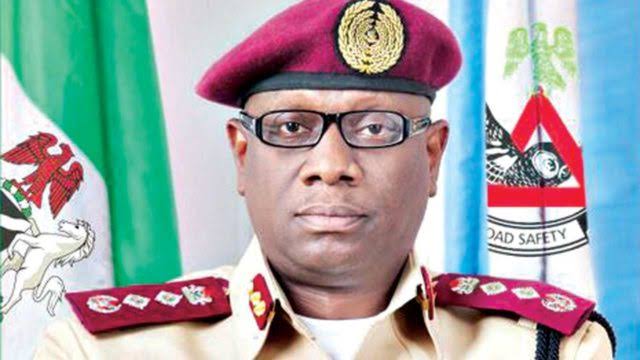Metro
Deepening Public Sector Leadership: The Oyeyemi’s FRSC Example

Ibrahim Maiwada, in this piece made available to National Association of Online Security Reporters, NAOSRE, examines the professionalism of FRSC under the quality leadership of Boboye Oyeyemi

There is a general aphorism that the reward for doing a job so well is being set on the track of more work, and in pursuing that logic, it is about also being allowed to perfect all the good work such person has engaged in, to ultimately bringing these to fruition.
The wisdom of the foregoing appears apt in relation to the situation of the Corps Marshall and Chief Executive of the Federal Road Safety Commission (FRSC), Dr. Boboye Oyeyemi. This is within the purview of what appears as an orchestrated campaign of calumny targeted at railroading him out of office, while his tenure at the helms of Nigeria’s primary road management authority is yet to end.
While there has been a lot of bean-counting around civil service rules and the legal or moral basis of his continuation in office, despite having attained the stipulated age of retirement, the fact remains that service at the upper echelons of public administration in the country basically depends at the discretion of the chief executive of the federation – the President.
It is the President who largely considers how his vision and directives have been well served and executed by any particular helmsman, and then decides on whether or not to keep such person at the duty post, as he seeks to maximise the effectiveness of public institutions, and deliver on the mandate given to him by the public.
Also, in a country in which the public space is charged with rhetoric about the promotion of a meritocracy, a tested and efficient cadre, appeals to our ‘better angels’ for public institutions to be run on the basis of excellence in human resource, and not to keep pandering to the pressures of ethnic, religious or other forms of quotas, it is not unthinkable for a President to want to stick to his ‘best eleven’ across the gamut of governance.
There is also some history behind this. A recall of such point to an instance during the administration of President Olusegun Obasanjo, who chose to keep one of the Inspectors General of Police that served under him, Sunday Ehindero, on beyond the demands of conventional retirement. In that regard, he had made a special concession and extension of years of service for Ehindero, to enable the Inspector General fully deliver on some of the security sector programmes of his government.
Currently, we also have the situation of the present service chiefs in the military apparatus, from the Army to the Navy and Air Force, who are staying on in office at the discretion of President Buhari, despite having reached their points of retirement from the forces. While many might not seem to understand the rationale behind keeping this gentlemen on at their duty posts, hence the ranging clamour for their replacement, yet it might not be far-fetched to consider that the Commander-In-Chief is possibly privy to a different level of information and intelligence – not likely to be easily available to the public – that informs his adopted stance.
Still, it remains a fact that Dr. Oyeyemi was duly reappointed for another four-year tenure in 2018, despite indications of almost having attained the age ceiling for service. This was an exercise of the discretion of the President, who appears to have been pleased with the work being carried out at the FRSC. Basically, the cadre of public officials that Dr. Oyeyemi belongs to serve at the pleasure of the President, whose disposition towards keeping them on the job could pertain to the critical roles that they play in sectors crucial to the safety of lives in the country.
There are testimonies that point out that Oyeyemi’s over three decades at the FRSC till date have been underscored by an unusual diligence to duty and relentless missioning after the objectives of the Commission. He is noted as being one of the foundational staff of the organisation, who rose through the ranks to arrive at its leadership; hence he is a true native of the system he administers. Having served in almost every department and formation of the FRSC, it is easy to see how he gained what has been described as the rounded reputation of a certified road traffic management administrator.
Its is public knowledge that on his watch at the FRSC, there has been a trending down of road accidents in the country, due to more campaigns around safe driving practices, wider monitoring of road use, and also a greater swiftness in the response to road accidents. These include both the emergency responses to preserving life by enabling prompt access to medical attention and the quick clearing of our local and major roads and highways, following unfortunate mishaps.
Oyeyemi is noted as having taken over command of the FRSC at a time when road traffic crashes in Nigeria were routine and so bad that they led to over 40,000 fatalities per year. This made the country rank second only to Ethiopia in terms of nations with the most dangerous roads to drive on.
Other testaments to the level of difference that Dr. Oyeyemi has made in Nigeria’s traffic management system highlight facts such as his introduction of policies, reforms and the digitisation process that have produced a sophisticated fleet system. These are observed to have been accomplished through the Road Transport Safety Standardisation Scheme that regulates and coordinates the fleet operation in the country.
Also, there have been the strengthening of the Driving School Standardisation Programme; the setting up of the “Safe to Load” programme, to reduce the rate of road accidents caused by articulated vehicles; and the rapid expansion of FRSC Commands through the creation of Outposts, several other Unit Commands, additional Drivers Licence Centres, and ambulance points.
Further to these, the inventory of achievements of Oyeyemi administration of the FRSC point to the introduction of speed-limiting devices for safer road use, the upgrading of the FRSC Academy to a degree awarding institution, and the establishment of an FRSC Traffic Radio for the better outreach of the Commission to the public on road safety.
The slew of vital programmes carried out under Dr. Oyeyemi as the Corps Marshall of the FRSC equally include the training of Federal Government drivers across the ministries, departments and agencies (MDAs) or government; the child restraint campaign; and the tyre campaign, which has sought to stem the influx and use of fake and expired tyres into the country.
More so, there has been the strengthening of inter-agency cooperation with relevant government institutions, such as the National Identity Management Commission (NIMC), the National Bureau of Statistics (NBS), Nigerian Customs Service (NCS), and banks, towards the harmonisation of data for national development.
The accomplishments that Dr. Oyeyemi have marshalled into road administration in Nigeria is observed as having served as a beacon in the continent till date, making the Sierra Leonean government send their road safety officials to understudy the success of the system in place in Nigeria, for adoption in their country.
With a doctorate degree in Transport Administration from the University of Nigeria, Nsukka; a Master’s degree in Public Administration (MPA) from the University of Lagos, and numerous certifications from institutions such as the Harvard University School of Government, and Royal Institute for Public Administration (RIPA), London, Dr. Oyeyemi appears certainly as well-heeled for the role he has been playing.
It is no surprise that through his direction, the FRSC has won a number of distinctions, such as best MDA in nation building, by means of the NITDA-NIHILENT e-Governance recognition in 2015, and the Award for Excellence in Humanitarian Service in Nigeria in 2015. More, so the Commission has granted the Service Delivery Award as one of the Outstanding Public Institutions in Nigeria by Independent Service Delivery monitoring Group (ISDMG), 2014-2015, among numerous other high profile recognitions that testify to the quality of its leadership.
Such a remarkable catalogue of accomplishments easily makes the case for the deepening of a particular form of painstaking leadership in the public sector and FRSC, which Dr. Oyeyemi represents. And, rather than the restless stoking of controversies around a duly renewed tenure, wouldn’t road management in the country and public service be better off if Oyeyemi is allowed to consolidate his achievements through the remainder of his time in office, and then pass a virile baton on to the next cohort of leadership?
Business
Elon Musk’s Team Accuses FEMA of Misusing $59 Million to House Illegal Migrants in Luxury Hotels

Elon Musk’s Team Accuses FEMA of Misusing $59 Million to House Illegal Migrants in Luxury Hotels
Elon Musk’s Department of Government Efficiency (DOGE) has made serious allegations against the Federal Emergency Management Agency (FEMA), claiming that the agency misused $59 million to accommodate illegal migrants in luxurious hotels.
The billionaire entrepreneur revealed this in a tweet on Monday morning, stating that the discovery was made last week. According to Musk, the funds were intended for American disaster relief but were instead diverted in violation of national regulations.
He wrote: “The @DOGE team just discovered that FEMA sent $59M LAST WEEK to luxury hotels in New York City to house illegal migrants. Sending this money violated the law and is in gross insubordination to the President’s executive order. That money is meant for American disaster relief and instead is being spent on high-end hotels for illegals! A clawback demand will be made today to recoup those funds.”
The revelation has sparked controversy, with critics arguing that FEMA’s allocation of funds should prioritize American citizens affected by disasters. The allegations have also intensified scrutiny on FEMA, which has faced previous accusations of financial mismanagement.
An inspector general audit recently revealed that FEMA mishandled nearly $10 billion in COVID-19 relief funds. The audit stated that $8.1 billion in costs remained questionable, while $1.5 billion was allocated prematurely and could have been better utilized for other emergencies.
As scrutiny mounts, former President Donald Trump has reportedly considered abolishing FEMA, describing the agency as “a disaster.” To address these concerns, Trump has established a council, led by Homeland Security Secretary Kristi Noem and Defense Secretary Pete Hegseth, to review FEMA’s operations and propose necessary reforms by late June.
The allegations against FEMA have triggered a broader debate on the proper allocation of taxpayer funds and the government’s role in disaster management. More updates are expected as the situation develops.
Business
Shepherd freight Cargo services Now in Lagos and Ibadan Nigeria

Shepherd freight Cargo services Now in Lagos and Ibadan Nigeria.
Business
Access Holdings: Imprints of a Thriving Banking Powerhouse

Access Holdings: Imprints of a Thriving Banking Powerhouse, By Bolaji Israel
Access Holdings has continued to evolve and reinforce its corporate stature as a formidable force in Nigeria’s financial sector, demonstrating capacity for relentless growth, resilience and ambition through strategic expansion and innovative approaches. The entity owes its significant bulk to the Access Bank Group, supported by other allied services firms.
Also known as Access Corporation, the group has grown over the last 35 years to emerge as Nigeria’s largest financial holding company, offering services such as commercial banking, lending, payment, insurance, and asset management.
Though Access started off as a corporate bank, it swiftly expanded into personal and business banking in 2012, solidifying its role as a well rounded financial solutions provider.
In his memoir, ‘Leaving the Tarmac: Buying a Bank in Africa, ‘ Aigboje Aig-Imoukhuede detailed how himself and his partner, Herbert Wigwe walked the delicate path of buying Access Bank and never looked back since.
The bank’s acquisition in March 2022 by the maverick duo of Aig-Imoukhuede and Wigwe, which changed its entire growth, profit and branding trajectory as well as its merger with Diamond Bank in 2019 which shot up its customer base to over 42 million, granting it a status of the largest bank in Africa by customer base and the largest in Nigeria by assets, form a part of its remarkable and turnaround milestone.
With a keen focus on digitisation-driven growth and customer satisfaction, it has not only solidified its status in Nigeria but has also set its sights on becoming a formidable player in the international banking arena.
The group’s growth and expansion drive has been marked by a series of strategic acquisitions and mergers aimed at enhancing its market presence and delivering value to customers. In 2021, Access Bank acquired African Banking Corporation (ABC Holdings), a move that significantly bolstered its operations in Southern Africa. This acquisition allowed Access Bank to enter markets such as Botswana, Mozambique, and Zambia, thereby enhancing its regional footprint and customer base.
In addition to its African ventures, Access Holding has been eyeing opportunities in Europe and Asia. Recent announcements highlight the bank’s interest in potential partnerships and acquisitions that could facilitate its entry into these lucrative markets. The bank’s management has stated, “We are committed to diversifying our operations and exploring new markets that align with our growth strategy.”
The results of the expansion efforts have been promising. For the year ending 2023, Access Holding reported a staggering 300 percent growth in profit after tax to N612.4 billion, from N204.1 billion in 2022. This represents the largest profit ever recorded by the company, under the leadership of its late co-founder, Herbert Wigwe.
It revenue soared by 80% to N2.6 trillion, from N1.4 trillion in 2022 while assets rose by 78% to N26.7 trillion, from N14.99 trillion in 2022, marking a significant growth trajectory that positions Access Holding as one of Nigeria’s largest and most influential banks.
Leading Force in Financial Sector
Access Holding’s influence in the financial sector extends beyond its impressive growth metrics. The bank has taken on a leading role in advocating for financial inclusion and economic empowerment across Nigeria and Africa. Through various initiatives, Access Holdings is committed to providing access to banking services for underserved populations, thereby contributing to the broader goal of economic development.
The bank’s emphasis on technology and innovation has positioned it as a leader in the digital banking space, setting benchmarks for other financial institutions to follow. By continuously enhancing its service offerings and embracing new technologies, Access Holding is shaping the future of banking in Nigeria and beyond.
Innovations and Technological Advancements
Access has prioritized innovation as a cornerstone of its growth strategy. Over the past two years, the bank has invested heavily in upgrading its technology infrastructure to provide customers with seamless and efficient banking experiences. The launch of a robust digital banking platform is a clear testament to this commitment. The improved platform allows customers to perform a wide range of transactions, from fund transfers to bill payments, all from the convenience of their mobile devices.
The bank’s mobile banking app has also seen significant upgrades, incorporating features such as biometric authentication, personalized financial insights, and enhanced security protocols. These innovations have resulted in a marked increase in user engagement, with over 10 million active users reported in 2024.
Moreover, Access has revitalized its Point of Sale (POS) services to cater to the growing demand for cashless transactions. The bank has deployed thousands of POS terminals across Nigeria, facilitating secure and efficient payment solutions for businesses and consumers alike.
Leadership and Succession
The unfortunate demise of Dr Herbert Wigwe, CFR, the Company’s founding Group Chief Executive Officer and former Group Managing Director of its flagship subsidiary, Access Bank Plc on Friday, February 9, 2024, in a helicopter accident in the United States of America, would have constituted a permanent clog for any company without a formidable structure.
Access Holdings has however been able to rise above the dark moment and steadied the ship with the return of Aigboje Aig-Imoukhuede as Chairman and emergence of Bolaji Agbede as GCEO. The swift realignment is a clear testament to the group’s ability to deftly manage succession.
Growth Outlook and Ambition
Access growth results and targets highlight its ambitious nature. The banking group aims to achieve a market capitalization of ₦10 trillion by 2025, with plans to expand its customer base to over 50 million across its operational territories. This ambition is supported by strategic partnerships and potential mergers, not only within Nigeria but globally.
Analysts have noted that Access Holdings is well-positioned to capitalise on the growing demand for financial services across Africa and beyond. With a solid foundation and an eye on expansion, the bank is poised to become a leading financial institution on the global stage.
The landscape of mergers and acquisitions in the banking sector has been vibrant, and Access Holdings is keen on exploring potential opportunities. In Nigeria, the banking industry has witnessed a wave of consolidation, with several banks seeking to enhance their market positions through strategic mergers. Access has expressed interest in potential acquisitions that align with its growth strategy, particularly in the areas of technology and customer service.
Globally, the banking group is also exploring partnerships that can facilitate its entry into new markets. The management has indicated that Access Holding is open to collaborating with fintech companies and other financial institutions that can complement its service offerings and enhance customer value.
Awards and Commendations
Access Corp’s commitment to excellence and innovation has earned it numerous accolades over the past year. The bank was recognized as the “Best Bank in Nigeria” at the Global Finance Awards, a prestigious honour that underscores its leadership position in the industry. Additionally, the bank received the “Most Innovative Bank” award at the African Banking Awards, highlighting its commitment to embracing technology and improving customer experiences.
These awards reflect a solid dedication to maintaining high standards of service and its ability to adapt to the rapidly changing financial landscape.
Access Holdings trajeectory stands as a testament to what can be achieved through strategic expansion, innovation, and effective leadership. With its aggressive growth strategy, commitment to technological advancement, and dedication to customer satisfaction, it is firmly establishing itself as a thriving banking conglomerate.
-

 celebrity radar - gossips6 months ago
celebrity radar - gossips6 months agoWhy Babangida’s Hilltop Home Became Nigeria’s Political “Mecca”
-

 society6 months ago
society6 months agoPower is a Loan, Not a Possession: The Sacred Duty of Planting People
-

 society5 months ago
society5 months agoReligion: Africa’s Oldest Weapon of Enslavement and the Forgotten Truth
-

 news6 months ago
news6 months agoTHE APPOINTMENT OF WASIU AYINDE BY THE FEDERAL GOVERNMENT AS AN AMBASSADOR SOUNDS EMBARRASSING












